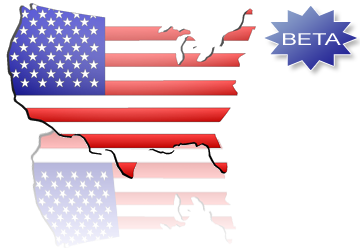The More Things Change, The More They Stay The Same
I am always hopeful for move civility in American politics. I’ve written on several occasions about the silliness and poor manners many of our elected officials stoop to. However, I’m also realistic about the nature of the beast and so, despite being hopeful for election campaigns which are issues based and void of mud, I never honestly expect to see that in my lifetime.
I think of this each day as I read discussion threads on various political forums, or browse the comments sections on multiple news and political blogs. Because each day there’s always someone who will comment about how they wish it were more like the old days, when politicians would disagree on policy but could still maintain sincere personal friendships with one another, regardless of their party affiliations.
That sounds nice, but it really isn’t how it’s ever actually been in American politics. Sure, there have been exceptions to the rule over time, and you’ll often hear ex-politicians speaking fondly of members of their opposing party in interviews (because civility sells books).

John Adams 2nd US President and Vice-President to George Washington
But in all honesty, ever since Vice-President Adams (serving under President Washington, and despite Washington’s public efforts to avoid partisan politics taking root in America), and Treasury Secretary Alexander Hamilton (whom Washington appointed as the first U.S. Secretary of the Treasury) scurried about to officially form and introduce the first real organized political party in America, the Federalist party, since that time there has been no true civility in our politics. In fact, it was far worse in the past than it is today.
Today, we hear evening news sound-bites, there is campaign trail lies and half-truths, prime-time television gets overwhelmed with ugly commercial advertising, and it’s fair to argue that all that cheapens us as a society. But, in the early days our leaders allowed their ideological divides and sharp-tongued rhetoric to escalate into fist fights, an occasional all-out brawl, and even so far as fatal pistol duels.
In other words, American politics is today as it’s always been since Washington was in office, an ugly race to the bottom.

Alexander Hamilton portrait by John Trumbull 1806
On a somewhat related side note for those interested in the fate of our first political party, the Federalists. They were a pro-business & industry, pro-expansion, pro-banker, free trade promoting bunch. One of their first big agenda moves was for Treasury Secretary Hamilton to convince Washington that revolutionary war veterans would benefit if speculators (the one-percenters of their time, and supporters of the Federalist party) were allowed to buy up their compensation notes. These notes are what many veterans were given in exchange for their service during the revolution, and in theory were supposed to be usable to buy military bounty lands directly from the new government. In other words, for fighting and serving to establish the new nation, veterans (in theory) would be able to leave service and use their notes to get property which they could settle on and work.
However, Hamilton and Vice-President Adams also pushed in congress for legislation that limited settlement on military bounty lands to blocks of 4,000 acres or more. This effectively made the compensation notes veterans received useless, because no veteran–including those who served as Generals–was given enough notes to purchase even half that much land with.
This created a situation where the veterans were left holding notes that they couldn’t do anything with, and once Hamilton convinced Washington to allow speculators to buy those notes from the veterans, it was a pathetic fleecing of our nation’s first military vets.
Speculators were buying the small bundles of notes from each veteran for essentially pennies on the dollar, pooling them into large bundles and then exchanging them for real estate purchases from the new government. In many cases, speculators were buying prime farming and coastal property as cheaply as a nickel an acre. Future stories suggest some veterans who sold their notes to speculators received as little as $2 total benefits for their multiple years of service in our nation’s fight for independence, while the speculators accumulated massive wealth from the deals.
Moves like these quickly made the Federalists unpopular with the masses, and the party brand suffered from it. They began losing elections, and despite years of trying couldn’t repair their poor public image. Finally in the 1820′s, after almost 30 years in existence, the party formally disbanded.
It’s former members didn’t just go away though, and with their ideologies unchanged they soon formed again as the Whig party. Once again wedding themselves to the nation’s industrial and upper-class citizens.
The major agenda items this time around were arm-twisting the government into financially supporting industrial growth (nothing like getting Uncle Sam to pay your business expanses for you, is there?), and weakening the southern caucus in congress, to create more favorable conditions for the northern industrial empires to exploit the cheap lands, labor and resources of the south. A quiet drum-march to (civil) war was begun.
The Whig party’s intentions were obvious, and just like they did as the Federalist party, they quickly lost favor with ordinary voters. This time, it took only twenty years for the party’s brand to become almost worthless, and in the mid 1850′s the Whig party disbanded. Unfortunately, much of the damage had already been done, and conditions were now ripe for igniting the civil war.
Once the Whig party ceased to exist, its former members (who were earlier the formal Federalists) jumped into another newly formed party, the Republican party.
And once again the new party was populated with all the same people, holding all the same ideas and intentions. But, they had learned a lesson in politics and brand protection. They had learned to disguise their true intentions with divisive, populist rhetoric.
In the 1850′s members of the new Republican party, as many of their letters and memoirs of the time show, still held the same positions and desires that they had as Whigs (as did the earlier Federalists), such as the desire to open the south up to exploitation by northern businesses, but this time they didn’t make themselves as obvious.
Instead, they latched on to the divisive issue of slavery, the primary wedge issue of the time, and presented themselves as champions for equality and civil liberties. Because the issue of slavery was on the minds of every American by this point, due in part to seeds which were originally planted by the same people when they were Whigs attempting to weaken the southern politicians in congress, the tactic was highly effective and within 7 years Americans were shooting at one another.
Obviously, my understanding and accounting here is quite simplified to avoid turning this article into a novel, and there were many other factors and factions at work leading up to the civil war. The actions of the Whigs and Republicans were just one or two pieces of a greater puzzle and I’m not proposing anything beyond that.
My writing of this is to present and connect the ancestral dots of one political party, from the Republicans of today back to the first organized political party, the Federalists. I wonder as I write this, if in the future some other person will be writing a similar piece connecting the dots between a then extinct Republican party and an active Tea Party?
It also shows how wedge issues and rhetorical spin are still being used by some in partisan politics in the same way. To disguise true intentions and rouse populace support for things which often go against the people’s own self interests.
In other words, the more things have changed, the more they’ve stayed the same.



1 Trackback(s)